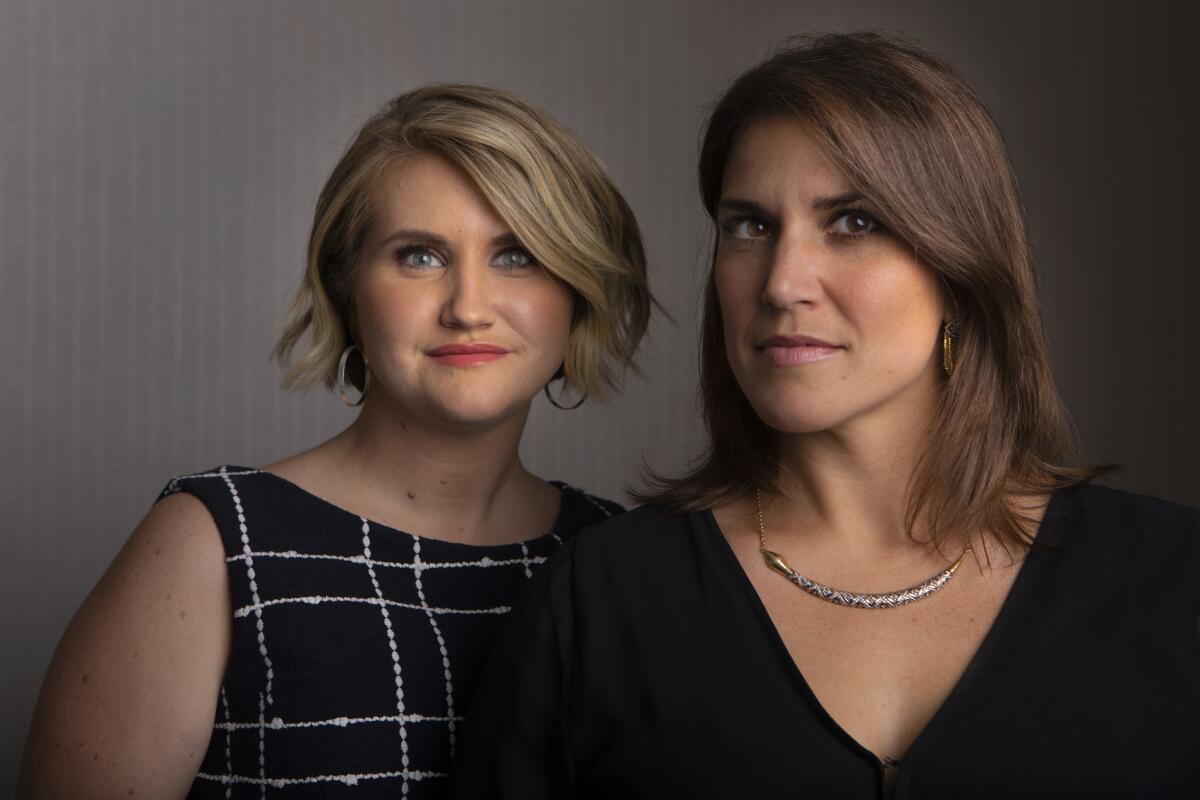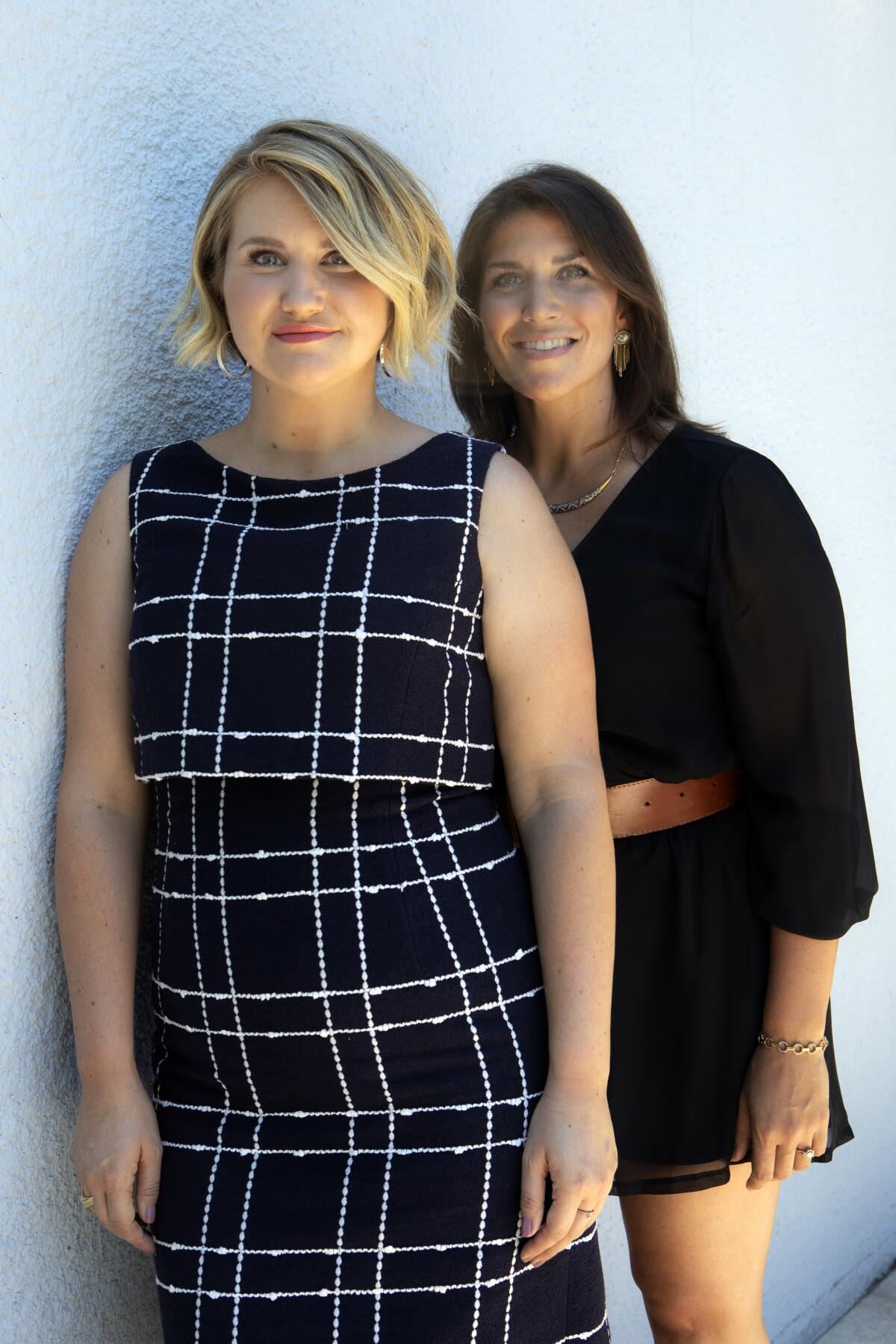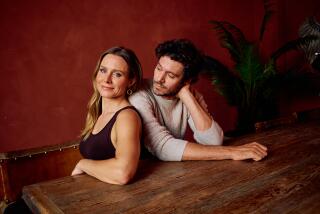What ‘Brittany Runs a Marathon’ taught Jillian Bell about body image

The instant Brittany O’Neill found out that a film about her life was going to premiere at the Sundance Film Festival, she started dieting.
The movie is, after all, a transformation story of how she’d gone from an unmotivated, out-of-shape twentysomething to a healthy marathoner who finished the 26.2-mile New York City race in under four hours.
“The constant refrain with my friends became: ‘I can’t eat anything, I’m going to Sundance,’” O’Neill recalled. “I was like, ‘I have to look like an “after” photo.’”
And when she flew to Utah last January for the debut of “Brittany Runs a Marathon,” she had dropped a lot of weight — one pound away from the ideal number she’d long dreamed of seeing on the scale. But her thin frame wasn’t received as positively as she’d hoped. Upon greeting Jillian Bell, the actress who plays her in the film, O’Neill was met with concern.
“I said something like, ‘Hey, I adore you, and I don’t know how to talk about this because it’s sensitive for all of us, but I want to make sure you’re OK,’” said Bell. “‘Are you eating regularly? Are you all right?’ You’re not normally in the public eye, and that’s a lot of pressure.”
“And of course, I was like, ‘Jillian thinks I’m too skinny!’” O’Neill said with a laugh. “It’s so sick. But my growth has been exponential because of that experience.”
Seven months after the festival — where the film sold to Amazon Studios in a major $14-million deal — the two women had reunited in Los Angeles days before the movie’s release. O’Neill had flown in from New York, where she works in fundraising at the International Rescue Committee. She and Bell, who came from her far-closer home in the San Fernando Valley, were eating breakfast and trying to ignore the heat outside at a restaurant on the Sunset Strip.

I like that it could inspire people to set a big goal and believe they’re capable of more than they think.
— Brittany O’Neill on the prize-winning movie inspired by her life
Because they live on opposite coasts, the actress and her real-life counterpart — both now 35 — didn’t actually meet until the film was months into production.
“I mean, it wasn’t like she was playing Margaret Thatcher or something,” O’Neill joked.
Bell was also focused on her own personal weight-loss journey. She began running — usually a couple of miles per day, and four at her maximum. She lost 29 pounds prior to filming and an additional 11 during the shoot. The experience, she said, helped to inform the character’s emotional state.
“When I first read the script, there were parts where I was like, ‘I don’t know why she’s struggling so hard in this moment, or lashing out at people,’ and then I did it,” Bell said. “I started getting mad at people who weren’t experiencing the same thing as me and didn’t understand why I was having trouble when people were ordering chips and salsa to the table.”
Because of the independent film’s tight production schedule — it was shot in just 29 days — Bell was sometimes required to wear prosthetics and a body suit to look bigger. She found the constant shift in appearance mentally challenging. With the extra weight off, she noticed crew members remarking on how beautiful she looked. When she had a pooch, nobody commented on her looks — or even thought to compliment the color of her dress.
The more weight she lost, the more alone she felt. She began looking at different women, evaluating their bodies and judging whether or not she was bigger or smaller than them. When she wrapped the film, she was skinnier than she’d ever been, but she was unhappy.
“Everyone was asking: ‘Do you feel great now? Is this the best you’ve ever felt?’ Someone even said to me, ‘This is the weight you should be,’ and I thought, ‘Well, that’s damaging,’” Bell remembered. “I was a little bit lost, getting all of these outside opinions when I didn’t know who I wanted to be. So I actually gained weight. I was so in my head, worrying about being in social situations where someone would comment on my weight loss in a negative or positive way. It just made me feel better to be somewhere in the middle.”
I was so in my head, worrying about being in social situations where someone would comment on my weight loss in a negative or positive way. It just made me feel better to be somewhere in the middle.
— Jillian Bell
These were the types of conversations Paul Downs Colaizzo was hoping to inspire when he set out to make “Brittany Runs a Marathon.” The writer-director began working on the screenplay in 2011, when he and O’Neill were roommates in New York City. The two had met at NYU, where they were both theater students, and reunited in their mid-20s to share an Upper West Side apartment. Colaizzo, who began his career as a playwright, was a script associate on Broadway’s “Sister Act”; O’Neill was the managing director of a theater company.
In their downtime, the friends would have a lot of what Colaizzo described as “big life talks,” discussing how they hoped to attain happiness and success. That’s when O’Neill — who felt like she was in a rut at her job and had struggled with her weight her whole life — began running, and her roomie noticed the positive change.
“Brittany is instantly lovable — so smart and charismatic — and I look at her and all I see is potential,” Colaizzo said over the phone. “But when we were younger, I don’t think she saw a path to fulfilling her potential. So, as her friend, I wanted to encourage her to find her way to that path. When she started taking the first steps to find it, I started writing it too.”
One night, on the couch, Colaizzo confessed to O’Neill that he was writing a movie about her. At first, because she was so obsessed with running, she was only concerned with what the character’s marathon time was. And she also didn’t fully believe the film would ever come to fruition. She’d been the first to read all of Colaizzo’s scripts over the years — plenty of which had never been turned into full-blown projects.
“But when I gave her the script, she went into her room and I remember just staring at her bedroom door, waiting for her to finish,” he recalled. “When she emerged, she was crying, and we just hugged each other for a long time.”
By the end of their 2½ years together as roommates, O’Neill had lost 80 pounds and found a boyfriend who would become her husband; Colaizzo was the officiant at her wedding. And though she recognized it was tempting to view her journey as a “thin-equals-happy story,” O’Neill kept reminding Colaizzo that she didn’t want the movie to have that message.
“I wanted to paint an honest picture of how the world treats people of different sizes,” the filmmaker said. “The goal was to show a woman’s journey to self-agency and self-respect while exploring the world that she has no choice but to do that in. It’s a story about a woman finding her own dignity, when an obstacle in doing that in this world is that men look at women differently if they look a certain way.”
When she first came to L.A. at 18, Bell was worried she’d be asked to change her look to get work as an actress. While that hasn’t been her personal experience, she bristles when she hears from female peers who’ve been advised to “get a nose job or maybe lose 20 pounds” by “some old man.”
“You become your own brand — and I hate that, but you do in this industry — and to be told that your company needs to lose 35 pounds is just ridiculous, and so upsetting,” she said.
A former “Saturday Night Live” writer, Bell has mostly been known as a supporting actress, turning in strong comedic turns in films like “22 Jump Street” and “Rough Night.” Before “Brittany Runs a Marathon,” she’d never carried a movie on her shoulders — and she’d also never really done dramatic work. (Paul Thomas Anderson did cast her in a small role in 2012’s “The Master” after seeing her on Comedy Central’s “Workaholics,” but she said she was on screen for “like 20 seconds, so that’s not really enough of a taste.”)
I fell in love with doing a movie that wasn’t a straight comedy. I was terrified of it, but I loved it.
— Jillian Bell on balancing drama with comedy in “Brittany Runs a Marathon”
“I didn’t know if I would enjoy being in something that had dramatic elements. But I fell in love with doing a movie that wasn’t a straight comedy. I was terrified of it, but I loved it. When I read this, I fell in love with her — I fell in love with you,” Bell said, looking at O’Neill. “I wanted to see this when I was a young girl. I wanted this message out there, and I wanted to be the one to do it.”
Neither Bell nor O’Neill are running as much as they used to. O’Neill has tendinitis that keeps her from putting in too many miles, but she still hits the gym regularly and teaches a circuit training class there once a week. She says people have already been approaching her and telling her that her story has inspired them to sign up for the marathon, though she doesn’t think that’s ultimately the message of the film.
“I like that it could inspire people to set a big goal and believe they’re capable of more than they think,” she said. “I think a lot of people think that when you try to make a big change, it’s an act of self-hatred or you’re trying to run away from something. But it can be an act of self-love, where you want something more for yourself.”
“It must be incredible for you to feel like you’re inspiring so many people,” Bell said, turning to O’Neill. “I did the film, and I was hoping it would be therapeutic — that I’d release my demons. I would say I lost about 70%, which I think is a high percentage of demons. The ‘You’re not good enough’ or ‘People won’t be attracted to you if ... ’ or ‘Are you on the end of the picture and your arm looks the biggest’ demons. Now, I try to throw those thoughts out the window. Why should I hold onto that as the truth of who I am?”
The actress talks about being put “in a box” and why starring in “Brittany Runs a Marathon” helped her break out of that at the L.A.
More to Read
Only good movies
Get the Indie Focus newsletter, Mark Olsen's weekly guide to the world of cinema.
You may occasionally receive promotional content from the Los Angeles Times.











